

Children's Commissioner for England. On Tuesday 24 November the Children’s Commissioner will be holding a live virtual event, presenting her vision for a better care system for children ahead of the upcoming care review.
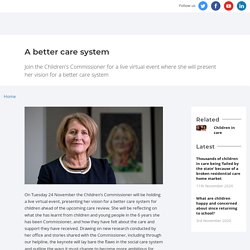
She will be reflecting on what she has learnt from children and young people in the 6 years she has been Commissioner, and how they have felt about the care and support they have received. Drawing on new research conducted by her office and stories shared with the Commissioner, including through our helpline, the keynote will lay bare the flaws in the social care system and outline the ways it must change to become more ambitious for children. The event is open for everyone to attend. If you are a care experienced child or young person, you can also send us your questions or take part in panel discussions.
Attend as a professional or guest Join Anne Longfield, the Children’s Commissioner for England, at 3pm on Tuesday, 24 November as she makes the case for reform of the care system for children. Sign up now. Part 2 of the analysis of the tyranny of resilience in Social Work practice: SW’s are drowning in an ideological ‘sea of me’ The Tyranny of Resilience in Social Work Practice (part 2) Our previous writings on the place and meaning of resilience in social work practice highlighted findings from our research which exposed practitioners experience of the application of resilience in practice as a punitive mechanism of coercion and control.
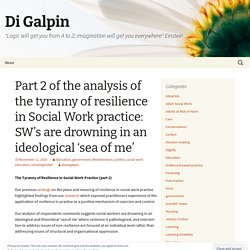
Our analysis of respondents comments suggests social workers are drowning in an ideological and theoretical ‘sea of me’ where reslience is pathologised, and intervention to address issues of non resilience are focused at an individual level rather than addressing issues of structural and organisational oppression. A striking feature of participants responses , which further supported the ‘individualisation’ of resilience in practice, was their need to control/manage their emotions as part of demonstrating resilience.
The inter-relationship between emotion and resilience is encapsulated in the notion of ‘emotional intelligence’. Research suggests Whilst Biggart et al (2016) state. These are some of our favorite Albert Einstein wall quotes.

Einstein was a brilliant mind with insights into many area's of life. Lets get to the quotes!!!!!!! Our death is not an end if we can live in our children and younger generations. Speaker — Lemn Sissay. Lemn Sissay: A child of the state. Shame – The Scary but Rewarding Journey of Working Through Your Shadows – Mariah Freya. Do you love uncomfortable moments so that you can work through your shit?
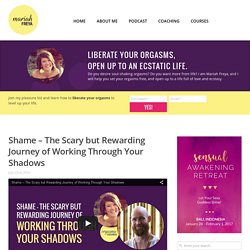
Most people don’t. By the way, shit here stands for: emotional shadow, shame, fear, guilt, worries and other scary emotions. I know a few folks (but in my experience that’s a rare species :-)) who love, seek or even put themselves voluntarily into uncomfortable situations so that they can work through their own stuff quicker. Why Trauma Survivors Can’t Just ‘Let It Go’ 465Save It seems the deeper I journey into the healing and recovery process, the more I find that much of our cultural and conventional wisdom does not help trauma survivors.
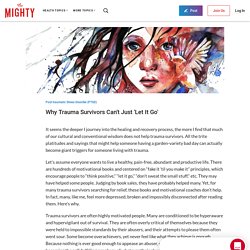
All the trite platitudes and sayings that might help someone having a garden-variety bad day can actually become giant triggers for someone living with trauma. Let’s assume everyone wants to live a healthy, pain-free, abundant and productive life. There are hundreds of motivational books and centered on “fake it ’til you make it” principles, which encourage people to “think positive,” “let it go,” “don’t sweat the small stuff,” etc.
How I found my vocation: 'My upbringing in care helps me as a social worker' ... I was seven when I went into foster care.
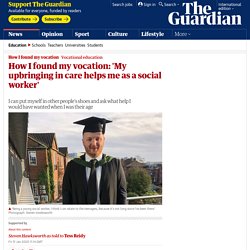
Social services were going to remove us anyway, but one day my mum just took me and my siblings to the council offices and left us; she told us we were going on holiday. We went to an emergency place for a week and then my older sister and I went to live with Janet and Robert, who ended up being my foster carers until I went to uni. My younger siblings were adopted. Living with my mum was chaotic: there was domestic violence, drugs and neglect. Sage Archetype - Discover Your Jungian Archetype Now! With all of the Sage's intelligence, there are certain weaknesses of this specific archetype that can seem slightly foolish.

Often times, Sage's can project themselves in a light of arrogance and might sub-consciously look down upon others for their lack of knowledge. They can also be stubborn when it comes to their opinions, especially when someone else expresses a conflicting opinion. Despite the Sage's rich amount of knowledge and intelligence, they struggle immensely when it comes to taking action. Going Full Circle by Laura Newman, Alan Kemp and Fern Basnett #careexperiencedresearch. Travel Quotes on Instagram: “Would love to hear your thoughts on this quote ❤️⠀ : : :⠀ Are you ready to explore someplace new? Get $47 towards your first stay with…”
The Need For Validation - Evolution Counseling. Psychoanalysis By Michael Schreiner | June 23, 2015 The need for validation is one of the most powerful motivating forces in human life.

It’s not always enough to know yourself that you’re doing a good job, that you’re a good person making good decisions. You want that confirmation from the social environment. But of course not all validation is created equal. Crying And Traumatic Experiences - Evolution Counseling. Emotions By Michael Schreiner | April 24, 2015 “What cannot be said will be wept.” – Sappho.

Speaking - Lisa Cherry. Book Lisa to Speak at Your Next Event A leading international speaker, trainer and consultant, specialising in assisting education professionals, those in social care and Foster Carers to understand trauma, recovery and resilience for vulnerable children, young people and their families.
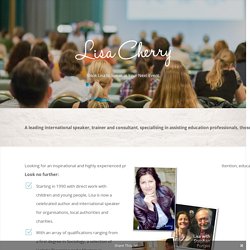
'Care never leaves you': how can we better support care-experienced adults? Photo: Stopabox/Fotolia. Why we need to listen to adult care leavers. Family life can provide us with a lifelong support network and a safe place to return to throughout our lives. But for those in care, what happens when aged 18 to 21 the state's duty of care ends? While much of the research on care leavers is focused on young people who have just left care, there is a lack of learning about their experiences in the longer term, says Zachari Duncalf, a research fellow at Strathclyde University in Glasgow, who specialises in care issues. Duncalf, herself a care leaver, is currently working on her PhD, an oral history project on the life stories of those who have been in care.
"All the research on leaving care focuses on 16- to 19-year-olds. Services usually cut off at 19 or 21, but they rarely leave services and usually [remain] under some care services with local authorities," she says. So what of Duncalf herself, who left care at 19 and spent four months homeless before gaining a degree five years later. 'I was being patronised': a care leaver's experience of a social work degree. Photo: Drobot Dean/Fotolia by Anonymous As a care leaver who has attended university twice, it was important to me that I wasn’t treated differently from my peers, a feeling shared among other care leavers who go into higher education.
How Each Myers-Briggs® Type Reacts to Stress (and How to Help!) - Psychology Junkie. Have you ever become so stressed out that you feel out of control? Do you feel like you’re acting in a way that is completely unlike you? Have you ever tried to help a loved one who is stressed out, and everything you’ve said or done has only made things worse? I know I have. Everyone reacts to stress differently and needs different things to calm them down. What works for you may not work for your spouse, your child, or your friends.
This post is incredibly long, so by all means just scroll down to the type that you want to find out about! Not sure what your personality type is? ESTJ – The Supervisor When overwhelmed by stress, ESTJ’s often feel isolated from others. INFJ Personality (“The Advocate”) “Treat people as if they were what they ought to be and you help them to become what they are capable of being.” The Advocate personality type is very rare, making up less than one percent of the population, but they nonetheless leave their mark on the world. Advocates have an inborn sense of idealism and morality, but what sets them apart is that they are not idle dreamers. These individuals are capable of taking concrete steps to realize their goals and make a lasting positive impact.
People with this personality type tend to see helping others as their purpose in life. Why It's So Hard to Build Healthy Relationships After Growing Up in Chaos. When we grow up in emotionally chaotic households, we face challenges in establishing healthy adult relationships. When chaos is the norm, we get accustomed to living with what feels bad and scary. Why It’s Okay to Feel Lost (And How to Find Your Way Again) “Feeling lost, crazy and desperate belongs to a good life as much as optimism, certainty and reason.” ~Alain de Botton.